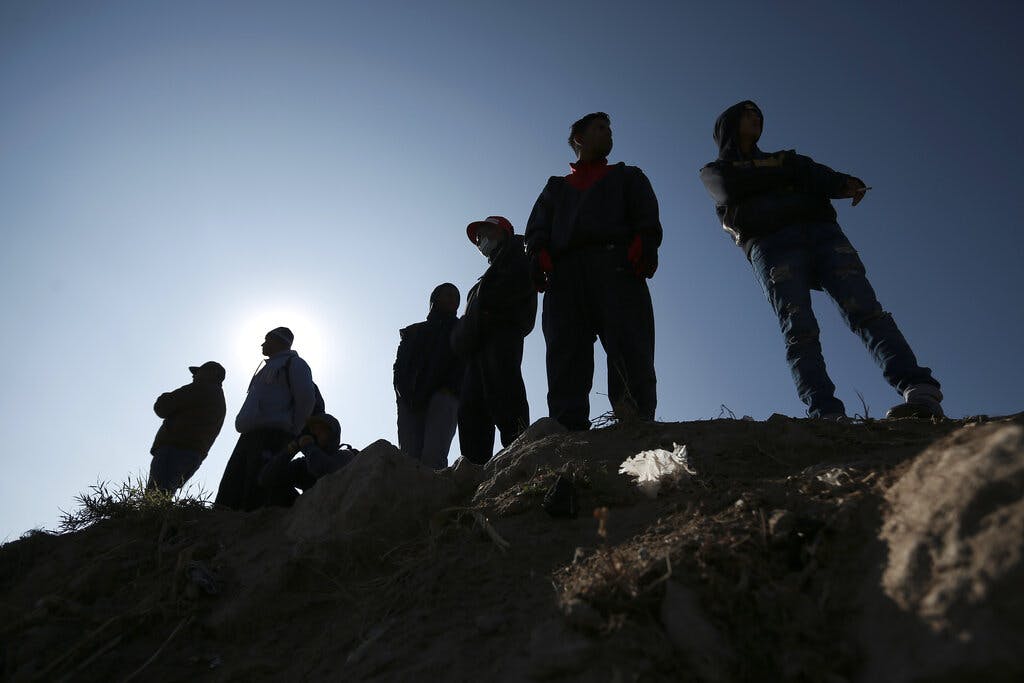Biden’s ‘Humanitarian Parole’ Migrants Likely To Be Left in Legal Limbo Much Like Obama’s ‘Dreamers’
A forthcoming study by the Manhattan Institute estimates that nearly 50,000 migrants from Cuba, Haiti, Nicaragua, and Venezuela have availed themselves of the Biden administration’s new humanitarian parole program for citizens of those countries.

President Biden’s migration policies are decreasing the number of illegal crossings at the border but are likely to leave those taking advantage of a new program in a legal limbo that could create a whole new headache for the next administration.
In response to the migration crisis, Mr. Biden instituted an unprecedented parole policy that allows thousands of migrants from Venezuela, Cuba, Haiti, and Nicaragua to enter America legally. The expiration of the benefit in two years, though, could create a political uproar similar to that faced by President Obama when he unilaterally issued his “Dreamers” edict of 2012 allowing adults who came to America illegally when they were minors permission to remain indefinitely.
An estimated 47,000 migrants from Cuba, Haiti, Nicaragua, and Venezuela have entered America under Mr. Biden’s new parole process for nationals of these countries, an immigration policy fellow at the Manhattan Institute, Daniel Di Martino, tells the Sun. About 24,000 of those entered the country in February alone, Mr. Di Martino calculates.
While the government doesn’t publish official statistics of the parole program, Mr. Di Martino estimated the results by looking at the fluctuation of migrants that entered the country without a visa through legal points of entry. His findings will be available in an upcoming report from the Manhattan Institute.
Mr. Biden announced in January that Mexico agreed to accept migrants from Cuba, Nicaragua, and Haiti who were deported for attempting to cross the border illegally. In exchange, America agreed to take in up to 30,000 pre-approved migrants from those countries every month. A program established last October already takes in 24,000 Venezuelan migrants a month. Afghan and Ukrainian citizens have also been entering America through a humanitarian parole program.
The Department of Homeland Security says unlawful crossings of Cubans, Nicaraguans, Haitians, and Venezuelans declined 97 percent after the new rule went into effect. Since the parole program was implemented, on a seven-day average, migrant encounters involving citizens of the target nations at the border dropped to 115 daily from 3,367, the department said.
The effort to reduce illegal immigration, Mr. Di Martino says, has been effective. He cautioned, though, that the program will likely bring uncertainty to those migrants who take advantage of it.
Migrants entering the new parole program must apply from their home countries, have a sponsor in America, and undergo a background check. Once in America, migrants must face the backlogged immigration courts and apply for asylum within a year of arriving. In 2022, only 14 percent of asylum requests were approved.
Mr. Biden’s parole program is a “short-term response” to improve migration management at the southern border, a policy analyst with the Migration Policy Institute, Ariel Ruiz Soto, tells the Sun. Just like Mr. Obama’s Deferred Action for Childhood Arrivals, the temporary nature of the parole leaves thousands in an uncertain state if the program is not renewed.
Despite many migrants having resources, information, and legal representation to seek other ways to assure permanent status in America, Mr. Ruiz Soto says, “It is often an uphill battle and not guaranteed.” In addition to the short duration of the parole program, “beneficiaries may face other barriers like administrative delays or language access,” Mr. Ruiz Soto adds.
At the moment, Afghans who fled to America under parole are battling to secure permanent legal status. About 4,700 of 77,000 Afghans were able to secure legal status in America, according to unpublished data from the Department of Homeland Security seen by CBS News. Without an approved measure by Congress, the remaining Afghan migrants could lose their right to live and work in America by July.
In January, the Texas attorney general, Ken Paxton, and 20 states sued the Biden administration over the parole program, claiming it “unlawfully creates a de facto pathway to citizenship for hundreds of thousands of aliens.”
Why these states oppose a program that is proving to be successful is “beyond my comprehension,” the homeland security secretary, Alejandro Mayorkas, told reporters in Florida in January.
“We have seen too much tragedy in the oceans of the Atlantic. We have seen a loss of life, and we have seen loved ones lose children and family members. It is not for people to take to the seas,” Mr. Mayorkas said. “We have provided a lawful and safe pathway for them to come here.”

